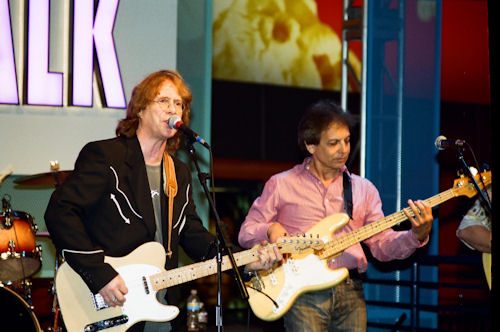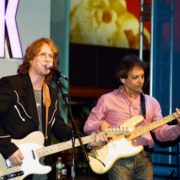BILL MUMY
ACTOR, MUSICIAN, SONGWRITER - AN ARTIST IN HIS PRIME

Bill Mumy – Photo by Karl F Anderson II
Bill Mumy is all about the music. He is a prolific musician, singer-songwriter, and a knowledgeable folk music enthusiast who hosts a themed radio hour twice weekly, Wednesdays and Fridays at 7 pm on www.ksav.org. Many of us will associate him with his days as a child actor, particularly that space-trapped kid who had the pet robot that uttered the famous phrase, Danger Will Robinson. And he has the right to be quite proud of a film and television career which included the series Lost In Space, two classic episodes of the Twilight Zone, co-starring with James Stewart in Dear Bridget and the underrated film from the 1970s, Bless The Beasts and the Children.
But, Bill Mumy is much more than this. In my childhood, with the two of us being the same age, I noticed one other fact about Bill. Where he went, music followed. My first memory was seeing him performing, Flowers on the Wall, the old Statler Brothers song, on a Jerry Lewis telethon in the mid-sixties. Then, in 1970, I looked at the stellar musicians on John Stewart’s now classic album Willard, including James Taylor, Carole King, Doug Kershaw, Chris Darrow, Linda Ronstadt, Carly Simon and there, on the opening track, Big Joe, credited with cowbell, is the name, Bill Mumy. Sounds familiar, I thought? Then, it’s 1971. I’m at Bob Stane’s legendary Ice House in Pasadena to see John Stewart for the first time. And there, as an opening act, is a band called Redwood with a familiar looking guy on guitar and vocals. Slowly, it dawns on me, it’s Bill Mumy. The child actor Bill of movies and television is now Bill of the music, the guitar and cowbell. Now, move ahead in time with me to 2008, in Malibu at the John Stewart Memorial Concert with Lindsey Buckingham, Timothy B. Smidt, The We Five, and members of The Kingston Trio. Out on stage comes Bill Mumy singing the very song for which he was credited with cowbell, Big Joe, the rarely (if ever) performed live opening track of Willard. And he’s doing it so well, I can almost feel the Lonesome Picker smilin’ down from singer-songwriter paradise. As he finishes the song, he looks over and smiles at drummer Russ Kunkl, a close friend and fellow session player on Big Joe.
Take one more walk with me through the time tunnel to just a few weeks ago. I scheduled this interview with Bill through his record company president, Karl Anderson. Karl is kind enough to send me a Box of Bill, three CD’s titled Carnival Sky, Speechless and The Landlord and the Guest. As I listened I was somewhat stunned. Bill Mumy is an excellent studio musician, an insightful singer-songwriter with a rough-hewn voice and lyrics that cut like a razor. There’s subtle anger at the political and international scene highlighted by lyrics like those from the song from Carnival Sky:
In the morning’s bright glare I became well aware
Of how heaven turned into such hell
And I swore there and then it won’t happen again
If I live long enough to tell
The lyric-driven songs cut deeper to the universality of feelings we all share as we face the larger world outside, within and in everyday relationships his message is simply one of hope and peace. In the songs on Carnival Sky, a more introspective, harder, and raw departure from earlier records, the influence of Springsteen’s Nebraska, Lennon’s Plastic Ono Band and Dylan’s Time Out of Mind can be felt…a rare record with a songwriter digging deeper into his own soul-journey process, emerging with a collection of songs which stands alongside the best songwriters of today.
TERRY: It looks like you’ve been pretty productive with your music these days.
BILL: Yeah. I’ve been busy with new albums. My new one, Carnival Sky is a departure from my last albums, which had a lot of harmonies, like a Brian Wilson influence. A lot of it was ear candy. But on this one, I started playing a groove and I kept it simple. I feel like this album is progress, not like going back. I’ve done both bands and solo stuff. A long time has gone by since the last release and I’ve had a long stretch of writing songs. I’m not writing songs right now, but it always comes back. It’s something I receive with gratitude.
TERRY: From the sound of it you’re going for a basic sound focused on lyrics.
Bill: It’s the mode I’m in right now. It’s a matter of providing space for the music. I’m working on a new emerging album that’s the same way…Sans harmony parts which I’ve done in the past. I like the stacked vocal harmony sound. In the past I’ve partnered with America with that kind of harmony. Carnival Sky is just my voice.
TERRY: Are you still recording new material?
BILL: I have a follow-up to Carnival Sky ready for release.
TERRY: The new songs sound like you’re going for something grittier than before. Like a Springsteen solo kind of thing.
BILL: I didn’t really get into Springsteen until Nebraska. I think he’s the greatest since Bob (Dylan). But, yeah, thanks.
TERRY: In some ways, with your new songs, it’s like you’re a new artist.
BILL: Yes. I’ve been making music since I was very young. At 11, I wrote my first song. Even on Lost in Space, there’s an episode where I was asked to play Sloop John B. For me, this is a new musical period which is lyric driven. Before, lyrics weren’t 100%.
TERRY: You’ve been known for your love of folk music.
BILL: Yeah. When I was a kid I turned down the Beatle’s concert at the Hollywood Bowl to see Pete Seeger. There’s this picture of all four Beatles and Angela (Cartwright). You can see where I was supposed to be.
TERRY: How has your songwriting changed?
BILL: There were times past where I didn’t have something to say. Then, you reach this realization, this feeling about time, a kind of historical feeling. They feel old. Now, my songs are rootsy, bluesy. I have a song on Carnival Sky called Long Enough To Tell which gets into the political scene, but then becomes personal. About relationships. A lot of what I’ve written about deals with relationships. I’ve been married for 23 years and we’ve had a stable relationship. With the songs though, I draw from over 20 years of angst in relationships.
TERRY: It seems you’ve also done some commenting on recent events.
BILL: The political scene has inspired some songs. It’s hard to write about the Bush administration without feeling angry.
TERRY: Tell me about your time with John Stewart.
BILL: The Willard sessions? Yes, I was there. Peter Asher rented out a mansion and brought along a lot of people. I played cowbell on the song Big Joe. I was standing next to James Taylor at the time. I was also on Marshall Wind. I remember crashing at Peter’s house back then. John became a mentor. I had always been a Kingston Trio fan. John taught me about performance, how to sing harmony. To be professional. He produced some tracks for my band It was a wonderful time.
TERRY: I remember seeing you open for John in ’71 or ’72?
BILL: Those were great days. I had a band called Redwood. We’d open for John and others six nights a week, two shows a night. That was when Bob Stane was the owner.
TERRY: A lot of your music today has the folk rock influence. Are you a Byrds fan?
BILL: Yes. They’re my band. I was fortunate enough to have seen The Byrds, not the originals but David Crosby, Chris Hillman and Roger McGuinn in the 1980s. I also saw them in ‘68 during the Clarence White period.
TERRY: Are you familiar with John York from that period of The Byrds? He’s a friend.
BILL: Cool. It’s good to hear about him. I loved his harmony vocals.
TERRY: Have you been doing much live work?
BILL: I do some solo-acoustic. I’ve been in a couple of good bands. But, it’s hard to do the road. After a while I just got burned out on the travel and all. So, I’d rather play within a hundred miles from home.
TERRY: What are your thoughts on spirituality and music?
BILL: Well, I’ve learned to respect the Muse. It’s like you get the inspiration for a song. To stay prolific I honor the Muse. I may wake up with an idea at 4:00 in the morning. I have a home studio so I can start writing. If it’s there, it wakes you up. it gives me an excuse to go into the studio. There’ll even be times when I have to excuse myself from a party, go into another room with a guitar and write. I’ve learned never to ignore the Muse. I don’t know where it comes from. It’s a gift. It doesn’t allow me to be artificial. When I receive an idea, I thank it for the gift. It’s been important for me to follow through. Even if it’s just one verse. Just write it. Follow it. If I say, I’m tired, it won’t happen. You have to really want it. Look out for it. If I don’t, it’ll go away. It’s amazing because I haven’t dried up for a while.
TERRY: Is this what happened with your recent albums on Global?
BILL: Absolutely. There’s nothing better than the true feeling of inspiration. It’s better than sex. I’m lucky to have the recording studio. I can follow through. I’ve come up with a lot of songs. Then, there’s the audience. Every artist has a group of people I call the ‘Hardcore 9.’ They listen to every word you write.
TERRY: Yes. I have artists I do this with. Some really demand it, like Bruce Cockburn.
BILL: Yes. He’s great. Ultimately, Bob (Dylan) is still #1. He’s still out there doing his music. He inspires new music. He loves to play and he still has passion in his new music.
TERRY: So, it sounds like the songwriting as a solo artist is where you’re at now.
BILL: It’s all in the joy of making and listening to music. One thing I’d like to mention. I have a weekly radio show on Wednesday and Friday nights at 7:00pm. It’s called The Real Good Radio Hour. I put together format for the show, like an hour on harmonicas and then I’ll play songs from Little Walter. Or there’ll be a show on Bluegrass and play only Bluegrass stuff.
TERRY: Sounds like Dylan’s radio show.
BILL: Yeah. Bob’s show was the catalyst for it.
TERRY: So, your records are being released on Global Records through Karl Anderson
BILL: Yeah, it gives me the ability to release uncompromising stuff. I think I’ve got four records in me.
TERRY: Well, I look forward to joining the “Hardcore Nine” on following your recording career. I’ll make it the “Hardcore Ten.”
BILL: Thank you very much.
To read more about Bill Mumy visit: www.billmumy.com
Terry Roland is an English teacher, freelance writer, occasional poet, songwriter and folk and country enthusiast. The music has been in his blood since being raised in Texas. He came to California where he was taught to say ‘dude’ at an early age.
BILL MUMY
ACTOR, MUSICIAN, SONGWRITER - AN ARTIST IN HIS PRIME













